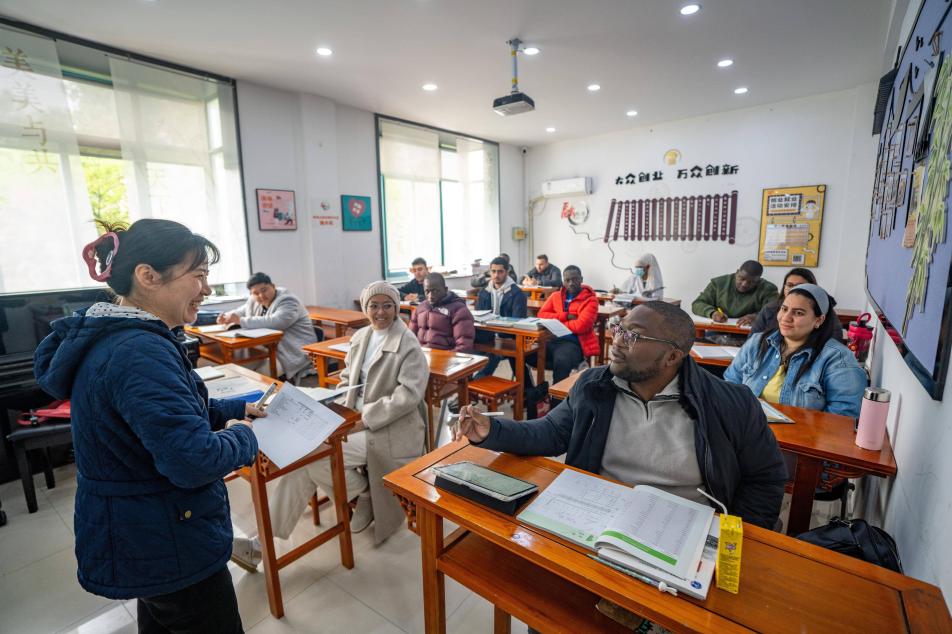




- BRNN
- BRI News
- BRNN News
- Database
Official Documents Polices and Regulations
Inter-government Documents International Cooperation BRI Countries
Business Guide Economic Data BRI Data
Trade
Investment Projects Latest projects
Cases - Content Pool

Foreign tourists make lacquer fans in an ancient town in Deqing county, Huzhou, east China's Zhejiang province. (Photo/Yao Haixiang)
Chinese President Xi Jinping recently replied to a letter from 61 young sinologists from 51 countries, who attended the 2025 World Chinese Language Conference in Beijing. Xi encouraged these young sinologists to continue to present a true, multi-dimensional and panoramic view of China to the world, contributing their wisdom and strength to building a community with a shared future for humanity.
His message reflects China's enduring commitment in the new era to openness, inclusiveness and mutual learning among civilizations, laying a cultural foundation for global cooperation.
Originating in China and belonging to the world, China studies represents a shared intellectual heritage of humankind. Over generations, sinologists have produced scholarly contributions that transcend time and cultural boundaries.
The evolution of China studies mirrors global historical trends. As one Argentine scholar noted, "More than 20 years ago, studying China could feel lonely; today almost everyone is talking about China." This remark highlights the growing global interest in China.
In recent years, an increasing number of international scholars have turned their attention to China, developing a genuine affinity for Chinese culture. Their work promotes academic exchange and mutual understanding, invigorating global cultural dialogue and fostering enduring international friendship and cooperation.

Foreigners learn Chinese in Jimingshan community, Yiwu, east China's Zhejiang province. (Photo/Yang Meiqing)
The rise of China studies also signifies the renewed vitality of Chinese culture in the new era. In South Africa, a young student learned Chinese to understand dialogue in the Chinese animated blockbuster "Ne Zha." In Spain, a social media influencer promotes Chinese street food Jianbing Guozi in the Tianjin dialect, wrapping it with Spanish ham.
Sites such as Nanping, southeast China's Fujian province, hometown of Zhu Xi, a great Chinese philosopher and a Confucian scholar of the Southern Song Dynasty (1127-1279), have become popular destinations for international students. Furthermore, vocational programs in Chinese-language livestreaming and e-commerce are in high demand among youth in Southeast Asia.
Around the world, interest in learning Chinese continues to grow. Today, more than 80 countries have incorporated the Chinese language into their national education systems, and the total number of international Chinese language learners and users has exceeded 200 million.
This linguistic enthusiasm is part of a broader cultural wave. Chinese music, film and television, games, online literature, and short dramas are reaching wider global audiences, creating vivid and dynamic cultural exchanges.
Such growing global interest underscores China's openness and inclusiveness in the new era. As China embraces the world and shares its development opportunities, a two-way cultural dialogue continues to deepen.

Foreigners learn about traditional Chinese medicine at a traditional Chinese medicine hospital in Nanyang, central China's Henan province. (Photo/Gao Song)
The expansion of China's visa-free entry policy has also facilitated cultural exchange, allowing more international visitors to experience its heritage firsthand. Many international influencers share their experiences online, offering authentic portrayals that broaden global perceptions of China. In the first half of this year, the number of foreign arrivals in China grew by 30.2 percent year on year, including 13.64 million visa-free entries, an increase of 53.9 percent.
As China's development attracts greater global attention and the country continues to open up, a growing number of people worldwide recognize that understanding China and its culture is essential to unlocking opportunities for cooperation and achieving shared success.
In an increasingly interconnected world, civilizations can only address common challenges and pursue shared development through equality, exchange, and mutual learning. Conferences such as the World Chinese Language Conference, the World Conference on China Studies, and the World Conference of Sinologists are becoming key platforms for cross-cultural exchange, dialogue, and cooperation.
Looking ahead, China will continue to promote the principles of equality, mutual learning, dialogue and inclusiveness among civilizations, while expanding platforms for global engagement.
Understanding the present requires a deep appreciation of historical roots, and recognizing contemporary China necessitates an understanding of its cultural foundations. It is through mutual learning among civilizations that shared progress becomes possible.
It is hoped that more international scholars will engage in China studies, working alongside their Chinese counterparts to implement the Global Civilizations Initiative, foster mutual understanding, mutual respect and mutual trust among nations, and jointly contribute to the advancement of human civilization.

Tel:86-10-65363107, 86-10-65368220, 86-10-65363106